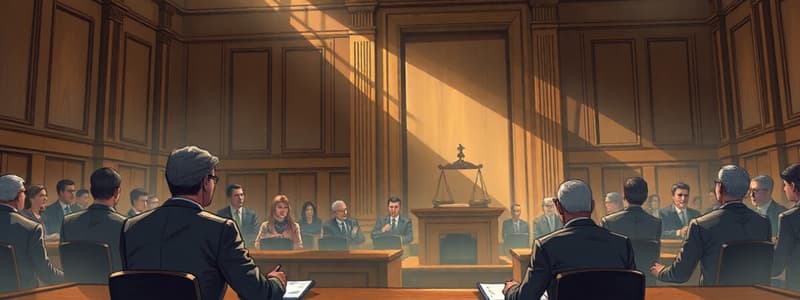Podcast
Questions and Answers
Which court typically handles family law cases?
Which court typically handles family law cases?
- Intermediate Appeals Court
- State Supreme Court
- Trial Court (correct)
- Federal Court
States are required to follow the court decisions of other states.
States are required to follow the court decisions of other states.
False (B)
What is the highest court in the state court system?
What is the highest court in the state court system?
State Supreme Court
The _____ courts deal with issues such as traffic, family, and criminal matters.
The _____ courts deal with issues such as traffic, family, and criminal matters.
Match the types of courts to their specific functions:
Match the types of courts to their specific functions:
In civil trials, who are the two main parties involved?
In civil trials, who are the two main parties involved?
The United States court system is based on an inquisitorial system.
The United States court system is based on an inquisitorial system.
What is the primary role of judges in trial courts?
What is the primary role of judges in trial courts?
In criminal trials, the government chooses to take action or prosecute the __________.
In criminal trials, the government chooses to take action or prosecute the __________.
Which amendment guarantees the right to a jury trial in criminal cases?
Which amendment guarantees the right to a jury trial in criminal cases?
Most civil cases are typically resolved through jury trials rather than being settled out of court.
Most civil cases are typically resolved through jury trials rather than being settled out of court.
Who has the power to choose whether to go to trial by jury in a criminal case?
Who has the power to choose whether to go to trial by jury in a criminal case?
What is a plea bargain?
What is a plea bargain?
A jury is always required in criminal cases.
A jury is always required in criminal cases.
Match the following amendments with their corresponding rights:
Match the following amendments with their corresponding rights:
What are three requirements to be selected as a juror?
What are three requirements to be selected as a juror?
In appeals courts, there are no ______ or witnesses present.
In appeals courts, there are no ______ or witnesses present.
Match the role with their responsibility:
Match the role with their responsibility:
What is a common outcome when a defendant pleads guilty?
What is a common outcome when a defendant pleads guilty?
A written opinion from an appeals court sets a precedent that all lower courts must follow.
A written opinion from an appeals court sets a precedent that all lower courts must follow.
What must a party claim in order to appeal a trial court's decision?
What must a party claim in order to appeal a trial court's decision?
Flashcards
Trial Courts
Trial Courts
Settle disputes between two or more parties in civil cases, or between the government and a defendant in criminal cases.
Civil Trials
Civil Trials
Disputes between two groups of citizens.
Criminal Trials
Criminal Trials
Cases where the government prosecutes a defendant.
Adversarial System
Adversarial System
Signup and view all the flashcards
Amendment 6
Amendment 6
Signup and view all the flashcards
Amendment 7
Amendment 7
Signup and view all the flashcards
Plea Bargains
Plea Bargains
Signup and view all the flashcards
Judge's role in trial
Judge's role in trial
Signup and view all the flashcards
Jury Selection Requirements
Jury Selection Requirements
Signup and view all the flashcards
Jury Duty
Jury Duty
Signup and view all the flashcards
Pretrial Agreement
Pretrial Agreement
Signup and view all the flashcards
Trial by Jury
Trial by Jury
Signup and view all the flashcards
Appeals Court
Appeals Court
Signup and view all the flashcards
Precedent
Precedent
Signup and view all the flashcards
Jury Selection Process
Jury Selection Process
Signup and view all the flashcards
Appeals Process
Appeals Process
Signup and view all the flashcards
State Court Precedent
State Court Precedent
Signup and view all the flashcards
State Court Structure
State Court Structure
Signup and view all the flashcards
Trial Court Specialties
Trial Court Specialties
Signup and view all the flashcards
State Supreme Court Jurisdiction
State Supreme Court Jurisdiction
Signup and view all the flashcards
Appeals to Federal Court
Appeals to Federal Court
Signup and view all the flashcards
Study Notes
Trial Courts
- In civil trials, a plaintiff and a defendant are involved.
- Criminal trials involve the government and a defendant.
- Trial court decisions can be appealed to an appellate court.
- The US uses an adversarial system, where judges and juries are crucial.
- Judges ensure fair trials and protect the rights of parties.
- Judges guide juries on relevant laws during jury trials.
- Amendment 6 guarantees the right to trial by jury in criminal cases (federal and state).
- Amendment 7 guarantees the right to trial by jury in civil cases (federal only).
- In civil cases, parties can choose a jury trial or not.
Plea Bargains
- Plea bargains are pretrial agreements between the prosecutor and defendant.
- They can reduce the charges and penalties.
- Jurors determine the facts and apply the law when a jury trial is chosen.
Jury Selection
- Jurors must be at least 18 years old.
- They must be US citizens.
- They must be able to speak English.
- They must reside in the trial's state location.
Appeals Courts
- These courts review decisions of lower courts.
- Appeals are triggered when a party believes a trial court made a procedural error (e.g. using illegal evidence, incorrect jury instructions).
- No juries exist in appeals cases.
- Judges hear arguments from lawyers and decide if the original trial court decision was correct.
- Decisions in appeals set precedents for lower courts within the same jurisdiction.
- Supreme Court precedents are binding on all US courts.
State Court Structure
- State courts have similar structures to federal courts often with:
- Superior courts
- County courts
- District courts
- Municipal courts.
- Trial courts often specialize (families, traffic, criminal).
- Intermediate appellate courts review lower court decisions.
- State supreme courts are the highest state court. State supreme court rulings on state law are not appealable further within the state court system.
- State courts handle issues like family, traffic, probate, and criminal matters.
- State supreme courts can decide if a trial court decision involves a state law, or if issues are determined by federal law.
- If a state court decision involves federal law, the US Supreme Court has jurisdiction for appeal.
Studying That Suits You
Use AI to generate personalized quizzes and flashcards to suit your learning preferences.




